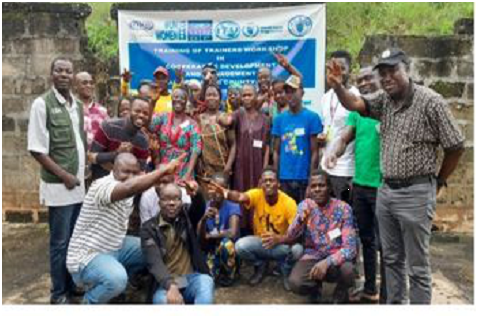As part of the United Nations Human Security Trust Fund Project, the International Labor Organization (ILO) has begun a 10-day workshop for training of trainers (TOTs) on cooperative development and management in rural Liberia.
The objective of the training that is being held in Gbarnga, Bong County, from August 10 to 20, 2023, is to empower trainers from the respective project communities (Zorzor and Yealla, Botota and Foequelleh, and Bahn and Gbanquoi in Lofa, Bong and Nimba Counties respectively), social partners, and other key stakeholders on cooperative development and management, to roll-out training to youth and women-led agricultural cooperatives and farmers-based organizations.
About 25 persons are participating in the training-of-trainers workshop.
They include representatives of the Cooperative Development Agency, project beneficiaries, and government counterparts at the national and local level, social partners and youth representatives.
The workshop focuses on various cooperative development modules, including Principles and values of cooperatives, Establishing and sustaining cooperatives, Gender participation in Cooperatives, Governance and leadership of Cooperative, and Cooperative Marketing, amongst others.
The 25 trainer candidates will cascade cooperative training to agricultural cooperatives, farmers’ organizations and youth or women groups, and will pay particular attention to the potential role of cooperative enterprises in addressing the human security challenges faced by the project communities.
The workshop is being conducted by a seasoned cooperative expert, Albert Mruma, from Tanzania.
Speaking on behalf of the ILO, Country Director responsible for Nigeria, Ghana, Liberia and Sierra Leone, Madam Vanessa L. Phala, the ILO Country Coordinator for Liberia, Salif Haji Massalay, said the workshop is being conducted within the framework of the United Nations Human Security Trust Fund Project.
Mr. Massalay said that this component of the project will empower and enhance economic empowerment and sustainability in the targeted communities of the project in the North Central region of Liberia.
Also making remarks, the Senior National Economist at UNDP-Liberia, Stanley Kamara, emphasized the importance of cooperatives as a means of empowering vulnerable community members for sustainable development.
Mr. Kamara thanked the ILO for its tremendous efforts being made in the implementation of the Human Security Project.
The Human Security Trust Fund project titled: Building Resilience of Youth, Women and Vulnerable Groups through Social Projection Floor in Liberia, aims to address the complex multi-sectorial and inter-connected challenges of human insecurities, particularly food, social, and economic issues for the most vulnerable and neglected populations of the North-Central region of Liberia at the community level.
The project promotes the concept of human security through implementing this initiative as a model human security with “protection” and “empowerment” measures as the most appropriate approach.
It will target 3,000 young women and men, household heads, including youth living with disabilities as direct beneficiaries (targeting 50% male and 50% female participants) and 10,000 indirect beneficiaries.
It is being implemented by five UN agencies, with FAO as the lead, supported by ILO, UNDP, WFP and UN Women. The Participants of the training-of-trainers were selected predominantly from within the project communities in Zorzor and Yealla, Botota and Foequelleh, and Bahn and Gbanquoi in Lofa, Bong and Nimba Counties respectively, as well as other social partners and key stakeholders who will also benefit from the intervention.
The establishment of cooperatives is one of the key components of the project in alleviating poverty, as the relevance of cooperative enterprises in prevention, mitigation and post conflict reconstruction has also been highlighted in various countries.
Cooperative enterprises have a valuable role to play, in terms of pooling know-how and resources, sharing risks and responsibilities, and ensuring a collective voice among those most likely to be severely affected by the impact of crisis.
This partly explains the relevance of the cooperative model in crisis response and recovery strategies and makes the role even more important in the Liberian context.


